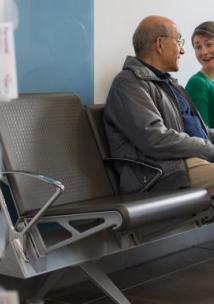The views of people using Musculoskeletal (MSK) services and staff delivering MSK services

MSK stands for Musculoskeletal and refers to the muscles, bones, joints, tendons and ligaments and associated tissue which make our bodies move and work. The NHS locally wants to review and improve healthcare provision. Working in partnership with the local NHS, we wanted to find out what patients and staff thought of current services and how they could be improved.
165 people using MSK services across Northamptonshire were interviewed and 35 clinical staff during April 2014.
Key findings:
The top three responses by patients on positive comments about MSK services were:
- Clinical staff and good rapport with patients - 92% of patients said they felt able to ask questions about their condition and felt listened to by their clinician. 86% felt that they were involved in decisions about their care
- Text appointment reminders
- The quality of care and treatment received
The top three responses by patients on how services could be improved:
Waiting times: for both first appointments, follow up appointments and at the clinics:
- Waiting times for first appointment varied from 1 day to 7 months (at the pain clinic) and the average waiting time for a follow up appointment was 4 to 6 weeks.
- Patients told us about clinic waiting times of up to 2 hours and the lack of receptionist services at a number of sites.
- The impact of waiting times on people’s lives is significant. 17% of people surveyed were on sick leave due to their condition (this may have been because of an elective procedure or an accident). A further 14% stated they were in pain but had no choice but to continue to work.
Communication between departments/GPs/Consultants :
- Nearly 50% of patients using more than one clinical service were frustrated at perceived poor communication between departments, particularly where treatment involved using services in another County
- Communication between departments and the reported lack of knowledge by the Patient Contact Centre are raised as concerns both by patients and clinical staff.
Cancelled appointments and not being given information as to why.
Staff highlighted good quality of care, good team working with diverse range of clinical skills and access to extended scope practitioners. Staff concerns included waiting times, the referral system, the need for admin/receptionists and access to psychology. Staff recommended GPs (family doctors) should be given clearer referral criteria guidelines to avoid inappropriate referrals which take up time.
Recommendations:
- Referral criteria should be reviewed in consultation with local patients and patient organisations, such as Arthritis Care and the British Society for Rheumatology, and evidence based best practice followed
- Waiting times for appointments and in clinics should be reviewed and reduced – this is likely to mean an investment of resources to run more clinics
- Consideration should be given to receptionists/additional admin staff at clinic sites
- Communication arrangements between clinical staff and departments, including out of County services, should be reviewed and improved
- Targets should be set to reduce the number of cancelled appointments
- If appointments are cancelled, patients should be clearly informed of the reasons for cancellation
- The CCGs should provide clarification on the next steps for MSK services and the overlap with current work by clinicians which is reviewing Rheumatology and Trauma & Orthopaedic service provision in the County.

